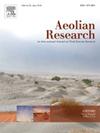Numerical study on snow erosion and deposition around an embankment with a snow fence under snowfall conditions
Abstract
Snow drift which usually occurs in conjunction with snowfall can significantly alter the distribution pattern of snow cover around roads creating travel hazards for vehicles. To study the snow distribution around a road and evaluate the snow prevention efficiency of snow fence, based on the theories of two-phase flow and snowdrift erosion and deposition, a numerical model is developed. The model includes snowfall during snow drift, spatial distribution characteristics of wind speed and snow phase volume fraction, and dynamic changes of snow drift shape on the ground during drifting. We simulate the distribution characteristics of snowdrift around an embankment without and with the protection of a snow fence and under the conditions of no snowfall and snowfall. The results indicate that snow deposition is greatest on the leeward side of the embankment in comparison to the windward side of the embankment and takes a longer time to reach equilibrium. On the leeward side of the embankment, the snow accumulation rate under the condition of snow falling is higher than that under the condition of no snow falling. Nonetheless, the two conditions both suggest that installation of the snow fence intercepts a large amount of snow behind the snow fence, decreases the snow phase volume fraction near the ground, and reduces the snowdrift accumulation on the leeward side of the embankment within a certain period.

 求助内容:
求助内容: 应助结果提醒方式:
应助结果提醒方式:


